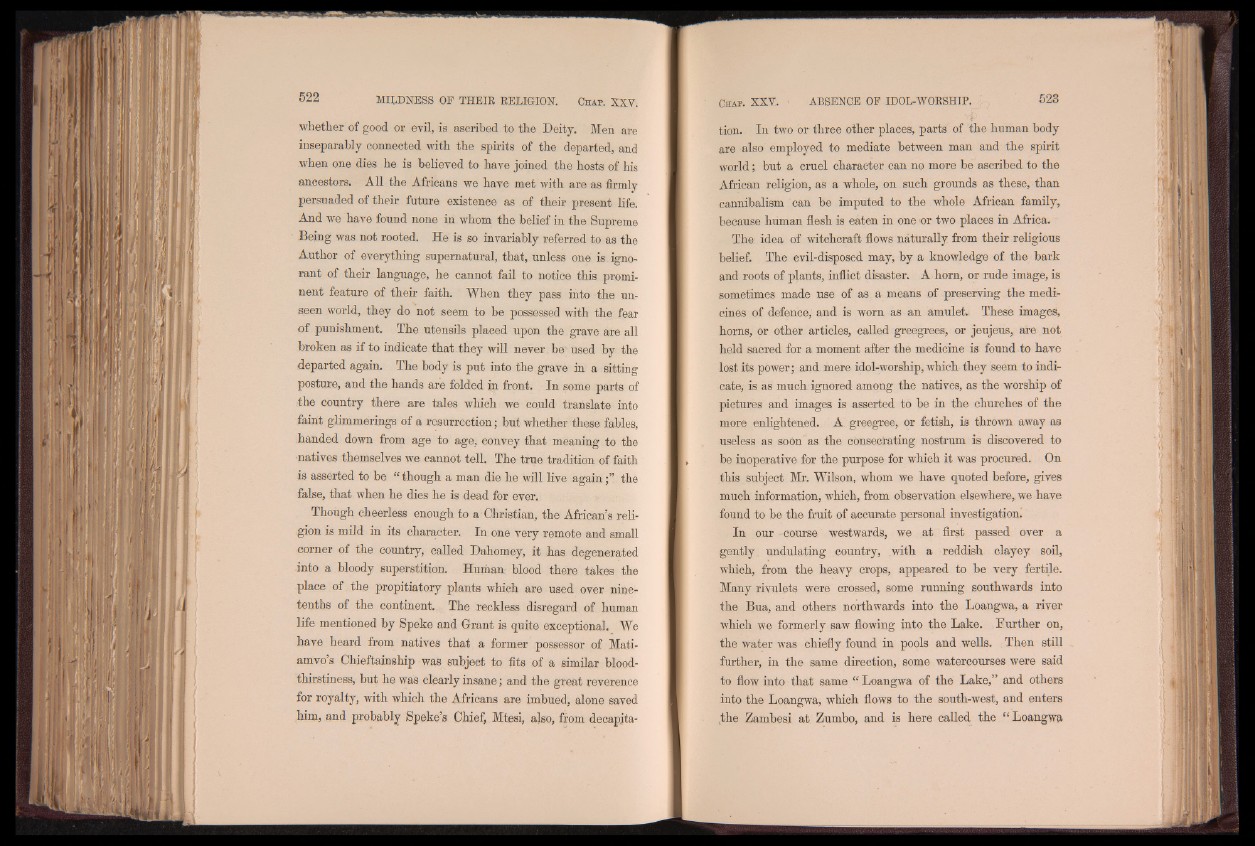
whether of good or evil, is ascribed to the Deity. Men are
inseparably connected with the spirits of the departed, and
when one dies he is believed to have joined the hosts of his
ancestors. All the Africans we have met with are as firmly
persuaded of their future existence as of their present life.
And we have found none in whom the belief in the Supreme
Being was not rooted. He is so invariably referred to as the
Author of everything supernatural, that, unless one is ignorant
of their language, he cannot fail to notice this prominent
feature of their faith. When they pass into the unseen
world, they do not seem to be possessed with the fear
of punishment. The utensils placed upon the grave are all
broken as if to indicate that they will never. be* used by the
departed again. The body is put into the grave in a sitting
posture, and the hands are folded in front. In some parts of
the country there are tales which we could translate into
faint glimmerings of a resurrection; but whether these fables,
handed down from age to age, convey that meaning to the
natives themselves we cannot tell. The true tradition of faith
is asserted to be “ though a man die he will live a g a i n t h e
false, that when he dies he is dead for ever.
Though cheerless enough to a Christian, the African’s religion
is mild in its character. In one very remote and small
corner of the country, called Dahomey, it has degenerated
into a bloody superstition. Human; blood there takes the
place of the propitiatory plants which are used over nine-
tenths of the continent. The reckless disregard of human
life mentioned by Speke and Grant is quite exceptional. We
have heard from natives that a former possessor of Mati-
amvo’s Chieftainship was subject to fits of a similar bloodthirstiness,
but he was clearly insane; and the great reverence
for royalty, with which the Africans are imbued, alone saved
him, and probably Speke’s Chief, Mtesi, also, from decapitation.
In two or three other places, parts of the human body
are also employed to mediate between man and the spirit
world; but a cruel character can no more be ascribed to the
African religion, as a whole, on such grounds as these, than
cannibalism can be imputed to the whole African family,
because human flesh is eaten in one or two places in Africa.
The idea of witchcraft flows naturally from their religious
belief. The evil-disposed may, by a knowledge of the bark
and roots of plants, inflict disaster. A horn, or rude image, is
sometimes made use of as a means of preserving the medicines
of defence, and is worn as an amulet.. These images,
horns, or other articles, called greegrees, or jeujeus, are not
held sacred for a moment after the medicine is found to have
lost its power; and mere idol-worship, which they seem to indicate,
is as much ignored among the natives, as the worship of
pictures and images is asserted to be in the churches of the
more enlightened. A greegree, or fetish, is thrown away as
useless as soon as the consecrating nostrum is discovered to
be inoperative for the purpose for which it was procured. On
this subject Mr. Wilson, whom we have quoted before, gives
much information, which, from observation elsewhere, we have
found to be the fruit of accurate personal investigation.
In our -course westwards, we at first passed over a
gently, undulating country, with a reddish clayey soil,
which, from the heavy crops, appeared to be very fertile.
Many rivulets were crossed, some running southwards into
the Bua, and others northwards into the Loangwa, a river
which we formerly saw flowing into the Lake. Further on,
the water was chiefly found in pools and wells. Then still
further, in the same direction, some watercourses were said
to flow into that same “ Loangwa of the Lake,” and others
into the Loangwa, which flows to the south-west, and enters
the Zambesi at Zumbo, and is here called the “ Loangwa